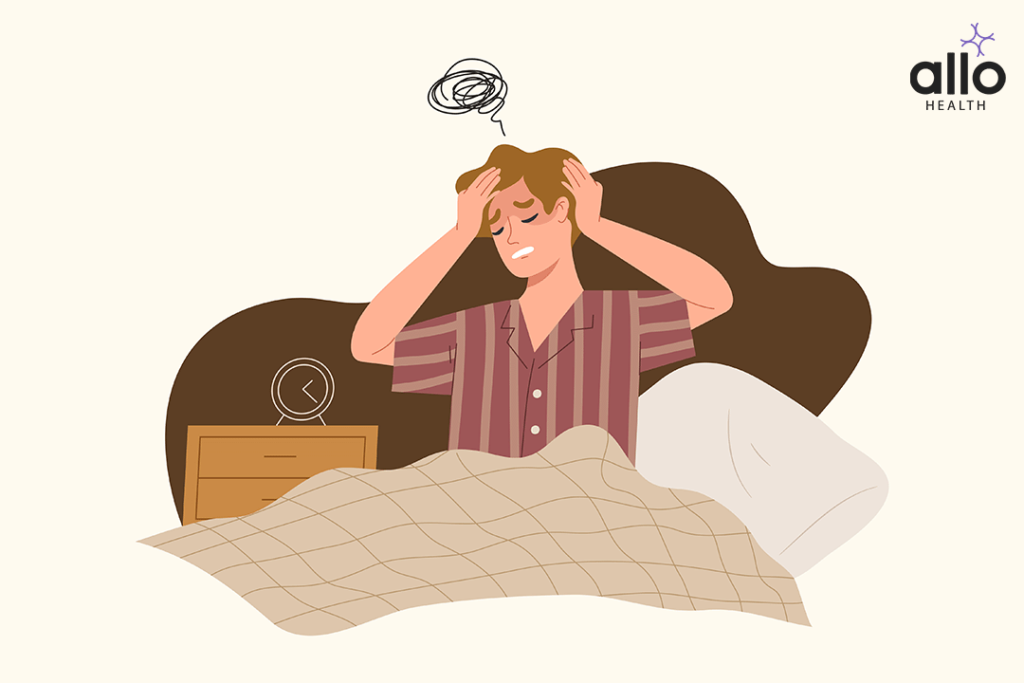Delayed Ejaculation Symptoms

Allo Health is dedicated to personalized well-being, offering support and trusted information tailored to individual health goals. The platform emphasizes human-generated content, led by a distinguished medical team of experts, including physicians and sexual health specialists. Their commitment to credibility involves rigorous fact-checking, authoritative research, and continuous updates to ensure accurate, up-to-date information. Allo Health's unique approach goes beyond conventional platforms, providing expert-led insights and a continuous commitment to excellence, with user feedback playing a crucial role in shaping the platform's authoritative voice.

A Psychotherapist with Clinical specialization, working for over seven years now. Areas of specialization range from Anxiety-related disorders, Mood-related disorders, Personality disorders, Sexual dysfunctions & other mental health issues.
Why This Was Upated?
Our experts continually monitor the health and wellness space, and we update our articles when new information became available.
Updated on 12 June, 2024
- Article was updated as part of our commitment to diversity, equity, and inclusion.

"The following blog article provides general information and insights on various topics. However, it is important to note that the information presented is not intended as professional advice in any specific field or area. The content of this blog is for general educational and informational purposes only.
Book consultation
The content should not be interpreted as endorsement, recommendation, or guarantee of any product, service, or information mentioned. Readers are solely responsible for the decisions and actions they take based on the information provided in this blog. It is essential to exercise individual judgment, critical thinking, and personal responsibility when applying or implementing any information or suggestions discussed in the blog."
When a man is unable to ejaculate or has difficulty reaching orgasm despite adequate stimulation. This condition can be caused by physical or psychological factors and can have a negative impact on a man’s sexual relationships and overall quality of life.
There are several physical causes of delayed ejaculation, including nerve damage, hormonal imbalances, and the use of certain medications. In some cases, the condition may be a side effect of surgical procedures such as prostatectomy.
On the psychological side, delayed ejaculation can be caused by stress, anxiety, depression, relationship problems, and other emotional or mental health concerns. It can also be related to sexual trauma or abuse.
Diagnosis of delayed ejaculation typically involves a physical examination and a review of the patient’s medical history. In some cases, laboratory tests may be necessary to rule out any underlying medical conditions.
Treatment for delayed ejaculation can vary depending on the underlying cause. For physical causes, effective treatments may include medication, hormone therapy, or surgery. For psychological causes, psychosexual therapy or counseling may be recommended to address any emotional or mental health issues.
This article will focus on the types of symptoms that those experiencing DE can go through.
Physical Symptoms
Physical symptoms of delayed ejaculation can include the following:
- Difficulty achieving an erection: Men with delayed ejaculation may have difficulty achieving or maintaining an erection. This can make it difficult to engage in sexual activity.
- Reduced sexual sensation: Some men with delayed ejaculation may experience reduced sexual sensation, making it difficult to reach orgasm.
- Prolonged time to ejaculation: Men with delayed ejaculation may take a longer time to ejaculate during sexual activity, which can be frustrating for both sexual partners.
- Inability to ejaculate: Some men with delayed ejaculation may be unable to ejaculate at all, regardless of how long sexual activity lasts.
- Stress and anxiety: Delayed ejaculation can cause stress and anxiety in men, which can further exacerbate the condition.
It is important to note that these symptoms can vary widely among individuals, and can be caused by a variety of factors, including psychological issues, physical problems, and certain medications. If you are experiencing any of the above symptoms, it is important to speak with a healthcare professional to determine the underlying cause and appropriate treatment.
Psychological Symptoms
One of the most common psychological symptoms of delayed ejaculation is anxiety or anxiety about performance. Men who struggle with this condition may feel anxious about their sexual performance, which can lead to further difficulties in the bedroom. They may also feel anxious about the relationship with their partner, and may worry that their partner will become frustrated or angry with them if they are unable to ejaculate.
Depression
Another common psychological symptom is depression. Men with delayed ejaculation may feel depressed about their inability to ejaculate, and may experience feelings of hopelessness or helplessness. This can lead to a lack of interest in sexual activity, and may also impact their relationships and overall quality of life.
Embarrassment
Men with delayed ejaculation may also experience feelings of embarrassment or shame. They may feel like they are “less of a man” because of their inability to ejaculate, and may have difficulty talking about their condition with their partner or a healthcare professional.
Sexual Frustration
Finally, men with delayed ejaculation may experience sexual frustration or feelings of inadequacy. They may feel like they are not able to fully enjoy sexual activity, and may feel like they are missing out on an important aspect of their sexual experience.
Sexual Dysfunctions
Delayed ejaculation is a sexual dysfunction that refers to the inability to reach orgasm in a timely manner, despite adequate sexual stimulation. While it may seem counterintuitive, it can sometimes cause premature ejaculation and erectile dysfunction.
Premature ejaculation occurs when a man ejaculates before or shortly after sexual penetration, which can be due to psychological factors such as performance anxiety and stress, as well as physical factors such as nerve damage. In some cases, men with delayed ejaculation may start to feel anxious about their sexual performance and this can lead to premature ejaculation.
Erectile dysfunction, on the other hand, refers to the inability to get or maintain an erection firm enough for sexual intercourse. In some cases, men with delayed ejaculation may become so focused on prolonging sexual activity that they ignore the signals from their bodies indicating that they need to stop, which can lead to fatigue, decreased blood flow, and ultimately, erectile dysfunction.
Taboos
Religious taboos and delayed ejaculation are sensitive topics that require a delicate and professional approach. Delayed ejaculation, also known as impaired ejaculation, is a medical condition in which a man takes a prolonged time to reach orgasm and ejaculate during sexual intercourse. While some religious beliefs and practices may contribute to this condition, it is important to understand that the root cause of delayed ejaculation may be physical, psychological conditions, or a combination of both.
Religious taboos, such as those related to sexual behavior, can also impact a man’s ability to reach orgasm and ejaculate. For example, some religious beliefs prohibit premarital sex or limit sexual activity to certain times of the month, which can create feelings of guilt or shame that can impact sexual function. Additionally, certain religious practices, such as abstaining from sexual activity for extended periods of time, can also contribute to delayed ejaculation.
It is important to seek medical advice if you are experiencing symptoms of delayed ejaculation. While religious beliefs and practices may play a role in the condition, a qualified medical professional can help you determine the underlying cause and provide appropriate medical treatment options. Treatment may include medications, counseling, or behavioral therapy.
Sexual Abuse
Sexual abuse can indeed have a profound impact on a person’s sexual functioning, including the ability to ejaculate during sexual activity. Delayed ejaculation, also known as inhibited ejaculation, is a condition where a person takes a longer time than usual to reach orgasm or may not be able to orgasm at all during sexual activity. This can be caused by physical or psychological concerns, and past sexual trauma or abuse can certainly contribute to the development of delayed ejaculation. It is important for individuals who have experienced sexual abuse to seek help from a mental health professional to address any lingering psychological effects and regain control over their sexual functioning.
Chronic Pain
When a person experiences chronic pain, it can interfere with their ability to have a fulfilling sexual experience. Pain can affect a person’s mood and make them feel stressed, anxious, or depressed. These emotions can have a negative impact on their sexual desire and performance.
Moreover, chronic pain can also cause physical problems that can contribute to delayed ejaculation. For example, chronic pain in the lower back, hips, or pelvis can cause nerve damage that affects the function of the genital organs. Additionally, chronic pain can lead to muscle tension and spasms, which can interfere with the normal functioning of the muscles involved in sexual activity.







































